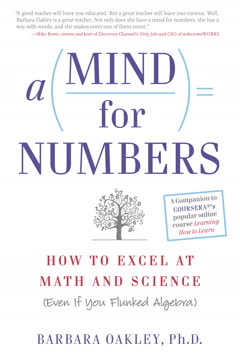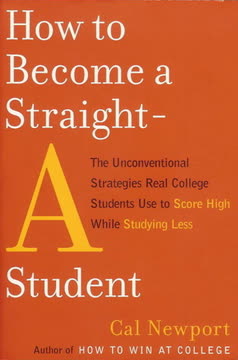Key Takeaways
1. Master Academic Efficiency: Prioritize and Optimize Your Study Habits
Don't do all of your reading.
Selective reading. Focus on the most important parts of assigned readings. Skim introductions, conclusions, and key sections rather than reading every word. This allows you to cover more material efficiently and focus on understanding core concepts.
Effective study techniques. Utilize the "Quiz-and-Recall" method, study in 50-minute chunks with 10-minute breaks, and start studying two weeks before exams. These techniques help optimize retention and prevent last-minute cramming. Additionally, build personalized study systems that work for you, such as using point values for review strategies or creating visual knowledge maps.
Time management. Prioritize tasks, schedule your free time, and avoid daily to-do lists in favor of time-blocking. This approach helps maintain focus and ensures a balance between academic work and personal time.
2. Engage Deeply with Your Academic Community
Befriend a professor.
Build relationships. Regularly attend office hours, ask thoughtful questions, and engage in discussions beyond class material. This helps create meaningful connections with professors, leading to potential research opportunities, recommendations, and mentorship.
Participate actively. Ask at least one question in every lecture, attend guest lectures, and get involved with your major department. These actions demonstrate your engagement and help you stand out among your peers.
Research involvement. Seek out research opportunities as early as possible, even if it means starting with menial tasks. This exposure can lead to more significant projects and valuable experience in your field of study.
3. Cultivate a Balanced and Healthy Lifestyle
Exercise five days a week.
Physical health. Maintain a consistent exercise routine, ideally working out three days a week and doing cardio on two other days. Regular exercise boosts energy, mental clarity, and overall well-being.
Mental health. Find an escape from campus life regularly, such as visiting a bookstore or taking a nature walk. This helps maintain perspective and reduce stress. Additionally, make time to laugh every day to boost mood and reduce stress.
Nutrition and sleep. Eat healthy meals during the week, allowing for more flexibility on weekends. Determine your optimal sleep duration and stick to it consistently, avoiding oversleeping or undersleeping.
4. Develop Strong Writing and Communication Skills
Write as if going for a Pulitzer.
Continuous improvement. Write outside of class regularly, whether for campus publications, personal projects, or extracurricular activities. This practice hones your skills and helps you develop a distinctive voice.
Quality focus. Approach every writing assignment as if competing for a prestigious award. Pay attention to structure, style, and clarity, not just content. This mindset elevates your work and makes the writing process more engaging.
Diverse communication. Publish op-eds in campus newspapers, practice public speaking, and learn to listen effectively in conversations. These skills enhance your ability to express ideas and engage with others meaningfully.
5. Pursue Ambitious Goals and Projects
Always be working on a "Grand Project."
Dream big. Identify your most heartfelt aspirations and design projects that move you toward these goals. This could involve writing a screenplay, launching a startup, or conducting original research.
Flexible approach. Choose goals but explore multiple routes to achieve them. Be open to adjusting your path as new opportunities arise or initial attempts fail.
Leadership roles. Become a club president or start your own organization. These experiences provide valuable leadership skills and help you stand out in your college community.
6. Build a Strong Professional Foundation
Jump into research as soon as possible.
Early involvement. Seek out research opportunities in your field of interest as early as your freshman year. This provides hands-on experience and helps build relationships with faculty members.
Strategic job choices. During summers and part-time work, prioritize positions related to your field of study or career aspirations. This could include internships, research assistantships, or self-created positions.
Skill development. Focus on building skills that are valuable in your chosen field, such as data analysis, programming, or technical writing. These skills make you more competitive for future opportunities.
7. Maintain Personal Growth and Self-Improvement
Inflate your ambition.
Continuous learning. Take challenging courses early in your college career, including subjects outside your comfort zone like art history and astronomy. This broadens your knowledge base and challenges you intellectually.
Self-reflection. Keep a work-progress journal to track your accomplishments and hold yourself accountable. Regularly assess your goals and adjust your strategies as needed.
Seek inspiration. Connect with high-achieving peers and learn from their experiences. Attend guest lectures and political rallies to expose yourself to diverse perspectives and ideas.
8. Navigate Social Life and Relationships Wisely
Make friends your #1 priority.
Balance social and academic life. Prioritize building and maintaining friendships, but avoid excessive partying or binge drinking that can derail your academic progress.
Stay connected. Keep in touch with friends from home while building new relationships at college. This support network is crucial for maintaining emotional well-being and perspective.
Community engagement. Participate in volunteer work quietly, focusing on the intrinsic rewards rather than external recognition. This helps develop a sense of purpose and connection to your community.
Last updated:
FAQ
What's "How to Win at College" about?
- Overview: "How to Win at College" by Cal Newport is a guide that offers unconventional strategies for achieving success in college.
- Focus: The book emphasizes balancing academic excellence with a fulfilling social life, aiming to prepare students for life beyond college.
- Approach: It provides 75 rules derived from interviews with top students across the country, focusing on habits, systems, and mindsets.
- Goal: The book aims to help students make the most of their college years by becoming standout individuals both academically and socially.
Why should I read "How to Win at College"?
- Unique Strategies: The book offers surprising and unconventional advice that goes beyond typical college success tips.
- Real-World Examples: It includes insights from successful students who have excelled in various fields, providing practical examples.
- Holistic Success: Newport emphasizes achieving a balance between academic success and personal growth, making it relevant for well-rounded development.
- Preparation for Future: The strategies are designed to not only help in college but also to prepare students for future career and life challenges.
What are the key takeaways of "How to Win at College"?
- Balance is Key: Success in college involves balancing academics with social life and personal projects.
- Start Early: Begin long-term projects the day they are assigned to avoid last-minute stress.
- Be Selective: Focus on excelling in one or two areas rather than spreading yourself too thin.
- Build Relationships: Befriend professors and get involved in research early to open up opportunities.
What are the best quotes from "How to Win at College" and what do they mean?
- "Don't have no regrets": This quote emphasizes living with a sense of excitement and possibility, valuing experiences over outcomes.
- "Start fast, end slow": Encourages beginning projects early to reduce stress and improve quality.
- "Make friends your #1 priority": Highlights the importance of maintaining strong social connections for emotional support and happiness.
- "Care about your grades, ignore your G.P.A.": Focuses on learning and understanding rather than obsessing over numerical grades.
How does Cal Newport suggest balancing academics and social life?
- Sunday Ritual: Create a Sunday ritual to set the tone for a productive week, balancing work and relaxation.
- Schedule Free Time: Plan your free time to ensure you have moments to relax without guilt.
- Involvement: Get involved in extracurricular activities early to build a social network and find balance.
- Prioritize Friendships: Make time for friends daily, as they are crucial for emotional support and happiness.
What is the "Quiz-and-Recall Method" mentioned in "How to Win at College"?
- Active Recall: Focus on actively recalling information rather than passively reviewing notes.
- Create Quizzes: Develop quizzes for yourself on the material you need to learn, ensuring you can answer without notes.
- Two-Step Process: First, review all material and create quizzes; second, quiz yourself until you can answer confidently.
- Engage Emotionally: Use emotion and energy, like pacing or speaking out loud, to reinforce memory retention.
Why does Cal Newport advise against daily to-do lists in "How to Win at College"?
- Unpredictable Schedules: College schedules are too unpredictable for rigid daily to-do lists to be effective.
- Time Blocking: Instead, use time blocking to allocate specific hours for tasks, allowing flexibility.
- Visualize Free Time: By visualizing your schedule, you can better manage your time and reduce stress.
- Adaptability: This method allows for quick adjustments when unexpected events occur, maintaining productivity.
How does "How to Win at College" suggest handling long-term projects?
- Start Immediately: Begin working on long-term projects the day they are assigned to avoid procrastination.
- Break into Chunks: Divide the project into manageable tasks and set arbitrary deadlines to maintain progress.
- Consistent Work: Use a work-progress journal to track daily accomplishments and hold yourself accountable.
- Avoid Last-Minute Rush: By starting early, you reduce stress and improve the quality of your work.
What is the significance of "Befriend a Professor" in "How to Win at College"?
- Mentorship: Professors can provide mentorship, guidance, and opportunities for academic and career advancement.
- Office Hours: Regularly attend office hours to build rapport and seek advice beyond class-related issues.
- Recommendations: A strong relationship with a professor can lead to valuable recommendations and introductions.
- Academic Success: Professors can help you navigate academic challenges and open doors to research opportunities.
How does Cal Newport recommend using summers in "How to Win at College"?
- Plan Early: Start planning your summer in January to secure interesting and relevant opportunities.
- Work or Intern: Find a job or internship related to your field of interest to gain experience and skills.
- Personal Projects: Use the summer to work on personal projects or develop talents with a structured plan.
- Maximize Experience: Treat summer as a time to explore interests and build a standout résumé.
What does "Inflate Your Ambition" mean in "How to Win at College"?
- Set High Goals: Encourage yourself to pursue ambitious goals that push your potential.
- Stand Out: Aim for projects that make you a standout, such as leading initiatives or creating original work.
- Challenge Norms: Look for ways to exceed expectations in your current commitments.
- Continuous Growth: Constantly seek opportunities for growth and development, both academically and personally.
How does "How to Win at College" address the importance of study environments?
- Library Focus: Emphasizes studying in the library to minimize distractions and enhance concentration.
- Secret Study Space: Find a personal, quiet study space for intense focus during major assignments.
- Avoid Dorm Rooms: Dorm rooms are filled with distractions and are not conducive to effective studying.
- Environment Matters: The right study environment can significantly impact productivity and learning efficiency.
Review Summary
How to Win at College received mostly positive reviews, with readers appreciating its concise, practical advice for students. Many found the tips useful, though some felt they were obvious or not applicable to all situations. Readers valued Newport's emphasis on balancing academics, social life, and personal growth. Some criticized the book for promoting an overly competitive mindset. Overall, reviewers recommended it as a helpful guide for college students, with many wishing they had read it earlier in their academic careers.
Similar Books










Download PDF
Download EPUB
.epub digital book format is ideal for reading ebooks on phones, tablets, and e-readers.












